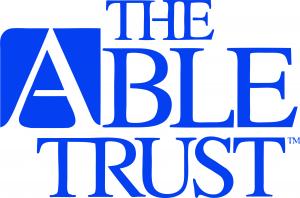The Able Trust Awarded $500,000 Helios Education Foundation Grant
Funding will help advance postsecondary student success for students with disabilities.
The three-year grant will support enhancements to High School High Tech, The Able Trust’s flagship youth program, which is celebrating its 30th anniversary. Helios Education Foundation funding will enhance the program’s capacity to support students in successfully transitioning from high school to post-secondary education.
“We are honored to partner with Helios Education Foundation on this important work,” said Allison Chase, President and CEO of The Able Trust. “Together, we’re working to ensure that more students with disabilities have the support, resources and opportunities they need to succeed in college and beyond.”
Statewide, only 28% of Florida students with disabilities pursue education or training after high school compared to 54% of High School High Tech students who plan on pursuing postsecondary education. The Able Trust is delivering a successful program that increases awareness of postsecondary options and promotes employment readiness.
“We’re proud to support The Able Trust as they work to advance educational success across the Central and South Florida region,” said Paul J. Luna, President and CEO of Helios Education Foundation. “They are on the frontlines of change—removing barriers to postsecondary achievement and creating new opportunities for students to thrive. We’re excited to partner on this important work.”
The Helios Education Foundation grant will enable The Able Trust to develop and pilot activities and resources that strengthen and improve High School High Tech in Orange and Broward Counties, two long-standing programs that serve youth with a wide range of disabilities. Through this grant, The Able Trust will ensure more students with disabilities are given the opportunity to learn about future education and career options, and set them on a more successful path to employment.
About The Able Trust
Established in 1990, The Able Trust, in support of the Florida Division of Vocational Rehabilitation, works with local school districts, education foundations and community nonprofits to prepare students for life after high school. The Able Trust youth programs are located in communities across Florida and serve 1,200 students each year. With an average high school graduation rate of 99% and postsecondary enrollment rate of 54%, The Able Trust youth programs are helping students envision and begin to work towards a future they might not have thought possible. To learn more, visit www.abletrust.org.
Tracey Lowe
The Able Trust
tracey@abletrust.org
Visit us on social media:
LinkedIn
Instagram
Facebook
X
Legal Disclaimer:
EIN Presswire provides this news content "as is" without warranty of any kind. We do not accept any responsibility or liability for the accuracy, content, images, videos, licenses, completeness, legality, or reliability of the information contained in this article. If you have any complaints or copyright issues related to this article, kindly contact the author above.
NBC12 Segment Features Johnathan H. Miller on Summer Home Staging Strategies in Richmond
UN Human Rights-Supported High Note Global Prize Awarded to the Song 'We Believe in Hope' on International Day of Hope
Best Rate Plumbing Emphasizes Role of Hot Water Heater Maintenance
Więcej ważnych informacji
 Jedynka Newserii
Jedynka Newserii

 Jedynka Newserii
Jedynka Newserii

Handel

Polskie MŚP otrzymają większe wsparcie w ekspansji międzynarodowej. To cel nowej inicjatywy sześciu instytucji
Firmy z sektora małych i średnich przedsiębiorstw otrzymają kompleksowe wsparcie na potrzeby zwiększania konkurencyjności na arenie międzynarodowej. Taki jest cel wspólnej inicjatywy instytucji zrzeszonych w Grupie PFR pod szyldem Team Poland. Obejmuje ona zarówno wsparcie kapitałowe, w postaci gwarancji, pożyczek czy ubezpieczenia, jak i doradztwo oraz wsparcie promocyjne i informacyjne, dzięki czemu mikro-, małym i średnim firmom łatwiej będzie podjąć decyzję o ekspansji zagranicznej. Pierwszy projekt dotyczy wsparcia dla firm zainteresowanych uczestnictwem w odbudowie Ukrainy.
Bankowość
RPP zgodna co do potrzeby obniżania stóp procentowych. Trwają dyskusje dotyczące tempa tych decyzji

W lipcu Rada Polityki Pieniężnej po raz drugi w tym roku obniżyła stopy procentowe, określając swój ruch mianem dostosowania. W kolejnych miesiącach można oczekiwać kolejnych obniżek, ale ich tempo i termin będą zależeć od efektów dotychczasowych decyzji i wzrostu płac. Docelowo główna stopa procentowa ma wynosić 3,5 proc. Te okoliczności sprzyjają kredytobiorcom.
Handel
Umowa z krajami Mercosur coraz bliżej. W. Buda: Polska nie wykorzystała swojej prezydencji do jej zablokowania

– Polska podczas prezydencji w Radzie UE nie wykorzystała szansy na obronę swoich interesów w sprawie umowy z krajami Mercosur – ocenia europoseł PiS Waldemar Buda. W jego ocenie polski rząd, mimo sprzeciwu wobec zapisów umowy, nie zbudował w UE sojuszy niezbędnych do jej odrzucenia. Porozumienie o wolnym handlu spotyka się przede wszystkim z protestami europejskich rolników, którzy obawiają się zalania wspólnego rynku tańszą żywnością z krajów Ameryki Południowej. Według europosła wszystko może się rozegrać w najbliższych tygodniach.
Partner serwisu
Szkolenia

Akademia Newserii
Akademia Newserii to projekt, w ramach którego najlepsi polscy dziennikarze biznesowi, giełdowi oraz lifestylowi, a także szkoleniowcy z wieloletnim doświadczeniem dzielą się swoją wiedzą nt. pracy z mediami.




![Część środków z Planu Społeczno-Klimatycznego trafi na walkę z ubóstwem transportowym. Organizacje branżowe apelują o zmianę priorytetowych projektów [DEPESZA]](https://www.newseria.pl/files/1097841585/rower3,w_85,_small.jpg)




.gif)

 |
| |
| |
|